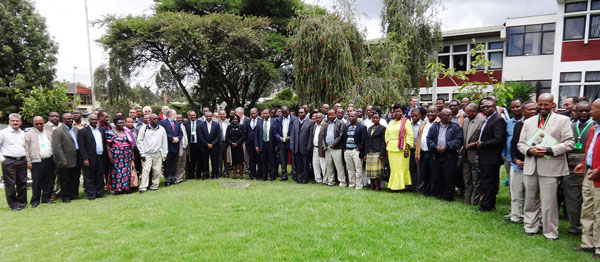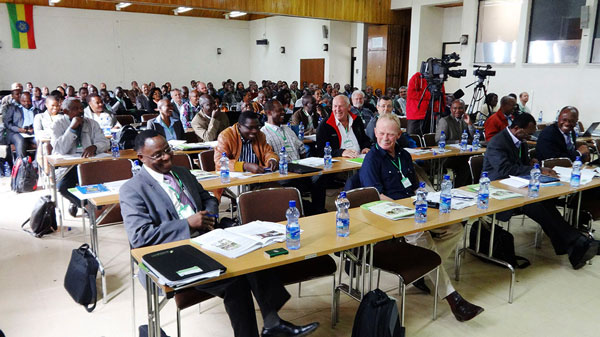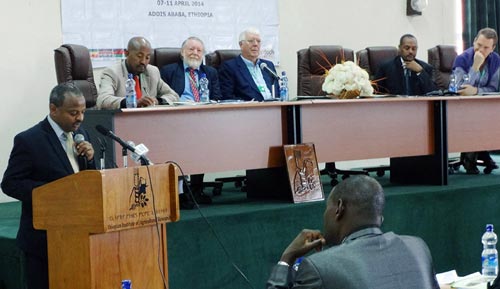 By Seifu Mahifere/CIMMYT
By Seifu Mahifere/CIMMYT
The Sustainable Intensification of Maize-Legume Systems for Food Security in Eastern and Southern Africa (SIMLESA) program has successfully completed its first phase with significant outputs that helped improve the food and nutritional security of smallholder farmers in eastern and southern Africa.
SIMLESA, funded by the Australian Centre for International Agricultural Research (ACIAR), was launched in 2010 to improve the livelihoods of smallholder farming communities in Africa through productive and sustainable maize-legume systems and risk management strategies that conserve natural resources. It is managed by CIMMYT and implemented by partners in Ethiopia, Kenya, Malawi, Mozambique and Tanzania. With lessons from these core countries, the program is also implemented in Botswana, Rwanda, South Sudan and Uganda.

SIMLESA’s first phase ended with its Fourth Annual Regional Review, Planning and Program Steering Committee meeting in Addis Ababa, Ethiopia, on 7-11 April. Sileshi Getahun, Ethiopia’s state minister of agriculture and the guest of honor, said the program has paid “substantial dividends” to sustainable agricultural development in eastern and southern Africa. The second phase of SIMLESA, which will also be funded by ACIAR, is expected to launch in July. “SIMLESA is a model for many regional and sub-regional collaborative projects to address agricultural intensification [in Africa],” Getahun told more than 120 representatives of SIMLESA partner organizations attending the event.
Mulugeta Mekuria, program coordinator, outlined the program’s main achievements in developing conservation agriculture (CA)-based sustainable intensification options, technology adoption by both female and male farmers, capacity building for national agricultural research systems (NARS) of partner countries and the creation of enhanced partnerships and collaboration for a common goal. He noted in particular that SIMLESA has contributed to the release of 40 new maize varieties, which have yield advantages of 10 to 30 percent when compared to existing commercial varieties in its program countries. The program also trained more than 3,000 agricultural scientists in the maize and legume production value chains and engaged more than 40,000 farmers (almost half of them women) through farmer field days and exchange programs.
John Dixon, ACIAR principal research advisor, expressed ACIAR’s commitment to support SIMLESA. The program is considered a flagship program and is being adopted by donors as a framework for sustainable intensification. Fentahun Mengistu, director general of the Ethiopian Institute of Agricultural Research and SIMLESA Program Steering Committee member, underlined that SIMLESA has significantly contributed to the generation and adoption of user-preferred maize and legume technologies, as well as information and knowledge that improve system productivity and profitability of the target farming systems. “The outcome of SIMLESA, in terms of human capacity and research facility building, will improve our efficiency and impact in agricultural research in the future,” Fentahun said. Olaf Erenstein, CIMMYT Socioeconomic Program director and SIMLESA Program Management Committee chair, said SIMLESA II will have a broader technological focus on systems and impact orientation as well as the creation of more partnerships and scaling out of program results.The week-long event featured country-specific achievements from Australia, Ethiopia, Kenya, Malawi, Mozambique and Tanzania, backed by poster displays showing success stories.

Participants also visited maize and legume seed production, forage and irrigated intercropping trials and the Melkassa Agricultural Research Centre, showcasing SIMLESA-supported technologies. They also saw an ultra-modern export company that cleans, grades and packages legumes and is linked with SIMLESA research teams in Ethiopia.
The SIMLESA Program Steering Committee commended SIMLESA for its substantive progress and NARS partners for their professionalism and skill during the meeting.
 Innovations
Innovations 
